Tariffs and Tensions: The Ripple Effect on the Global Auto Industry
January 22, 2025, 3:43 pm

Location: United States, California, Torrance
Employees: 10001+
Founded date: 1959
The automotive industry is a delicate ecosystem. A single policy shift can send shockwaves through it. Recently, U.S. President Donald Trump’s proposed tariffs on imports from Canada and Mexico have ignited fears among global automakers. The stakes are high. Consumers, manufacturers, and economies hang in the balance.
As Trump took office, he hinted at imposing tariffs of up to 25% on vehicles produced in these neighboring countries. This move is not just a political maneuver; it’s a potential game-changer for the automotive landscape. German carmakers, including giants like Volkswagen and BMW, have voiced their concerns. They argue that such tariffs would lead to higher prices for American consumers and ultimately hurt the U.S. economy.
The German automotive association, VDA, has been vocal about the implications. They warn that tariffs could push U.S. inflation higher, contradicting Trump’s campaign promise to reduce it. It’s a classic case of unintended consequences. The very policies intended to protect American jobs could backfire, leading to job losses and increased costs for consumers.
The auto industry is interconnected. Major manufacturers rely on a complex web of suppliers and production facilities across borders. Mexico plays a crucial role in this network. Many U.S. automakers produce vehicles in Mexico, benefiting from lower labor costs and favorable trade agreements. Tariffs would disrupt this balance, forcing companies to rethink their strategies.
The impact is already visible. Shares of Asian automakers and battery manufacturers have taken a hit. Companies like Honda, Hyundai, and Kia saw their stock prices drop as investors reacted to the uncertainty. South Korean battery makers, including LG Energy Solution and Samsung SDI, also faced declines. The fear is palpable. Tariffs could cripple their competitive edge in the U.S. market.
Volkswagen, the world’s second-largest automaker, expressed deep concern over the proposed tariffs. They highlighted their significant investments in the U.S., exceeding $10 billion. This includes a plant in Chattanooga and a joint venture with Rivian. The message is clear: they are committed to American production. However, the looming threat of tariffs casts a shadow over these investments.
Stellantis, the parent company of Chrysler and Jeep, is also feeling the pressure. Their chairman, John Elkann, has been actively engaging with the Trump administration, seeking to mitigate the impact of potential tariffs. The stakes are high for Stellantis, as they navigate a leadership transition while trying to protect their interests.
The automotive industry is at a crossroads. The shift towards electric vehicles adds another layer of complexity. As manufacturers pivot to meet changing consumer demands, the threat of tariffs looms large. Companies are already grappling with the challenges posed by rising competition from Chinese automakers. The last thing they need is additional pressure from U.S. trade policies.
The situation is reminiscent of a high-stakes poker game. Each player is trying to outmaneuver the others while protecting their own interests. The stakes are not just financial; they involve jobs, innovation, and the future of transportation. As automakers negotiate with the Trump administration, they are acutely aware of the potential fallout.
The VDA’s president, Hildegard Mueller, emphasized the importance of considering the contributions of German automakers to the U.S. economy. They provide jobs and foster growth. If tariffs are imposed, the industry will have to adapt. This could mean shifting production, raising prices, or even cutting jobs. The ripple effects could be felt far beyond the automotive sector.
In the broader context, these tariffs could strain U.S. relations with key allies. Japan and South Korea are not just competitors; they are vital partners in trade and innovation. The automotive industry is a cornerstone of their economies. A trade war could lead to retaliation, further complicating an already tense situation.
As the dust settles from Trump’s inauguration, the automotive industry watches closely. The potential for tariffs is a looming cloud. Companies are bracing for impact, but the full extent of the damage remains to be seen. Will they adapt, or will the tariffs drive a wedge between the U.S. and its allies?
In conclusion, the proposed tariffs on Canadian and Mexican imports are more than just a policy decision. They represent a critical juncture for the global automotive industry. The interconnected nature of this sector means that any disruption can have far-reaching consequences. As automakers navigate this uncertain landscape, the focus must remain on collaboration and innovation. The future of transportation depends on it.
As Trump took office, he hinted at imposing tariffs of up to 25% on vehicles produced in these neighboring countries. This move is not just a political maneuver; it’s a potential game-changer for the automotive landscape. German carmakers, including giants like Volkswagen and BMW, have voiced their concerns. They argue that such tariffs would lead to higher prices for American consumers and ultimately hurt the U.S. economy.
The German automotive association, VDA, has been vocal about the implications. They warn that tariffs could push U.S. inflation higher, contradicting Trump’s campaign promise to reduce it. It’s a classic case of unintended consequences. The very policies intended to protect American jobs could backfire, leading to job losses and increased costs for consumers.
The auto industry is interconnected. Major manufacturers rely on a complex web of suppliers and production facilities across borders. Mexico plays a crucial role in this network. Many U.S. automakers produce vehicles in Mexico, benefiting from lower labor costs and favorable trade agreements. Tariffs would disrupt this balance, forcing companies to rethink their strategies.
The impact is already visible. Shares of Asian automakers and battery manufacturers have taken a hit. Companies like Honda, Hyundai, and Kia saw their stock prices drop as investors reacted to the uncertainty. South Korean battery makers, including LG Energy Solution and Samsung SDI, also faced declines. The fear is palpable. Tariffs could cripple their competitive edge in the U.S. market.
Volkswagen, the world’s second-largest automaker, expressed deep concern over the proposed tariffs. They highlighted their significant investments in the U.S., exceeding $10 billion. This includes a plant in Chattanooga and a joint venture with Rivian. The message is clear: they are committed to American production. However, the looming threat of tariffs casts a shadow over these investments.
Stellantis, the parent company of Chrysler and Jeep, is also feeling the pressure. Their chairman, John Elkann, has been actively engaging with the Trump administration, seeking to mitigate the impact of potential tariffs. The stakes are high for Stellantis, as they navigate a leadership transition while trying to protect their interests.
The automotive industry is at a crossroads. The shift towards electric vehicles adds another layer of complexity. As manufacturers pivot to meet changing consumer demands, the threat of tariffs looms large. Companies are already grappling with the challenges posed by rising competition from Chinese automakers. The last thing they need is additional pressure from U.S. trade policies.
The situation is reminiscent of a high-stakes poker game. Each player is trying to outmaneuver the others while protecting their own interests. The stakes are not just financial; they involve jobs, innovation, and the future of transportation. As automakers negotiate with the Trump administration, they are acutely aware of the potential fallout.
The VDA’s president, Hildegard Mueller, emphasized the importance of considering the contributions of German automakers to the U.S. economy. They provide jobs and foster growth. If tariffs are imposed, the industry will have to adapt. This could mean shifting production, raising prices, or even cutting jobs. The ripple effects could be felt far beyond the automotive sector.
In the broader context, these tariffs could strain U.S. relations with key allies. Japan and South Korea are not just competitors; they are vital partners in trade and innovation. The automotive industry is a cornerstone of their economies. A trade war could lead to retaliation, further complicating an already tense situation.
As the dust settles from Trump’s inauguration, the automotive industry watches closely. The potential for tariffs is a looming cloud. Companies are bracing for impact, but the full extent of the damage remains to be seen. Will they adapt, or will the tariffs drive a wedge between the U.S. and its allies?
In conclusion, the proposed tariffs on Canadian and Mexican imports are more than just a policy decision. They represent a critical juncture for the global automotive industry. The interconnected nature of this sector means that any disruption can have far-reaching consequences. As automakers navigate this uncertain landscape, the focus must remain on collaboration and innovation. The future of transportation depends on it.


